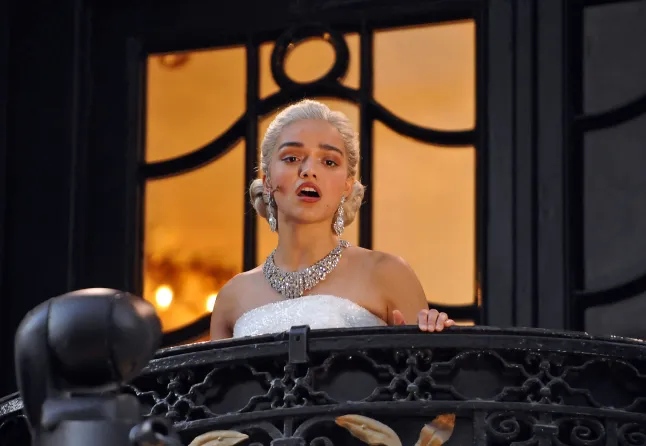Why Jamie Lloyd's Balcony Moment for Evita Is a Stroke of Genius
(Picture: Kerry Davies for Daily Mail)
by Chris Peterson
It’s one of the most iconic moments in musical theatre history. A woman steps onto a balcony, lifts her arms, and sings “Don’t Cry for Me Argentina.” We’ve seen it staged in every way imaginable, always aiming for grandeur and symbolism. But now director Jamie Lloyd has done something bold. He’s taken that moment off the stage and into the real world, where Rachel Zegler sings it from an actual balcony outside the London Palladium to the crowd below.
And honestly, it might be the smartest decision I’ve seen in a major revival in years.
This isn’t just clever staging or a viral moment for social media, although it’s certainly generating buzz. It’s a reimagined theatrical gesture that reframes everything we think we know about Eva Perón. It turns a moment of private confession into a public performance.
Now look. I know Jamie Lloyd is a polarizing figure. Some of his revivals have sparked strong reactions, both raves and eye-rolls. But I’ll say this. I appreciate the bold swings he takes. I would rather a director try something risky and divisive than play it safe and forgettable. And in the case of Evita, I think he’s made a daring choice that clarifies the show’s core themes rather than obscuring them.
That said, I’ve seen the frustration on social media. Some audience members are annoyed that the most iconic number in the show happens outside the theatre when they’ve paid to be inside. I get that. If it’s your first time seeing Evita, you expect to experience that moment in the room. But part of what Lloyd is doing is expanding the definition of the room itself. The balcony becomes part of the stage. The street becomes part of the set. And we, whether we like it or not, become part of the story.
Eva Perón was a performer long before she was a politician. She understood the power of visibility. And in Evita, her greatest performance is not in a theatre or on a film set. It is on a balcony, in front of her people. She wasn’t just speaking to them. She was captivating them. Winning them. Performing for them every single day. By putting Zegler on a real balcony, Lloyd makes that truth impossible to ignore. The people below aren’t pretending to be a crowd. They are the crowd. And we’re no longer watching from a distance. We are part of the moment. The line between fiction and reality dissolves. Eva’s public becomes us. That’s exactly what she wanted.
“Don’t Cry for Me Argentina” is often misread as a vulnerable confession. But it’s not. In my opinion, it’s a calculated monologue. Eva stands above the people saying she doesn’t care about fame, while basking in their adoration. It’s emotional misdirection at its finest. Now picture that happening outside, in the open air, with Zegler above the city and phones pointed up at her. The contradiction sharpens. This isn’t just a character asking for understanding. It’s a woman reclaiming the spotlight. It’s Eva doing what she did best. Turning emotion into power.
Eva’s legacy has always lived in contradiction. To some, she was a saint. To others, a manipulator. Her image was built more through myth than policy. Lloyd’s decision to stage her most famous moment outside the theatre invites us to confront that tension. Who is Eva really? An icon of compassion? A master of image-making? A little of both?
There’s also something undeniably clear about casting Rachel Zegler. She’s no stranger to the intensity of public attention. She’s been praised and criticized. Elevated and picked apart. Her career, like Eva’s, is filtered through constant exposure. Putting her on that balcony does more than cast her in a role. It invites her to channel the complexity of Eva’s story in a very real and personal way. A woman being watched. A woman wielding that attention.
This is not just staging. It is symbolism. It turns one of the most familiar songs in the musical theatre canon into something surprising, urgent, and alive. It reminds us that Evita is not a museum piece. It is a mirror. And in an age defined by politics as performance, Eva Perón’s story feels more timely than ever.
So yes. Jamie Lloyd’s choice to have Rachel Zegler sing from the balcony is a masterstroke. It’s thematically rich. It’s emotionally charged. It connects character and actor, history and present, audience and subject. It blurs the line between theatre and reality in the best possible way.
And in that moment, as her voice echoes over the streets of London, Rachel Zegler is not just playing Eva. She is Eva. And we are the crowd looking up, hanging on every word. I can’t wait to see how this looks in New York.
